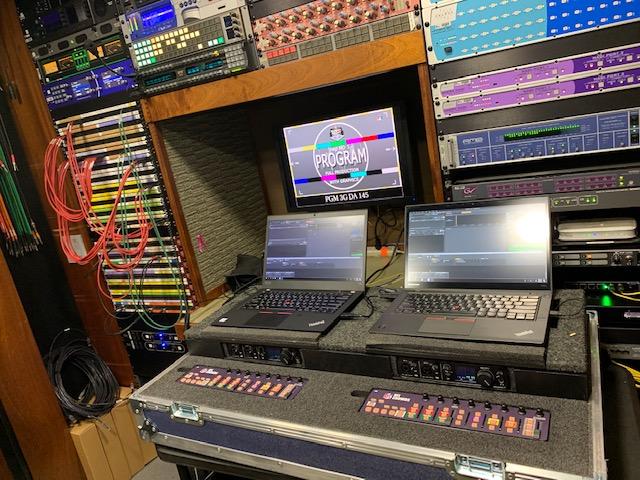Dynamic system uses actual team- and venue-specific audio files
Original Article shared from Sports Video Group News.
NFL broadcasts this season will use “enhanced” crowd sound. The league’s technology kit for this includes the Wwise platform, Audiokinetic’s authoring software for interactive media and videogames. This will let so-called audio-sweetener mixers access and mix sounds collected from each NFL stadium (except the two newest, in Los Angeles and Las Vegas) and team over the past four years; the sounds were harvested by NFL Films, the league’s media arm, which had serendipitously been collecting team and venue audio for postproduction and other applications.
Wwise will manage four channels of crowd sound through a four-channel MOTU interface and a USB-enabled Korg nanoKONTROL2 MIDI controller. Start and stop buttons control sounds that begin with basic crowd ambience, or “walla-walla” or “murmur” tracks, which will play continuously and act as a foundation for other sound elements. (They will not be looped sounds; a randomizer function on Wwise will draw from a wide range of those basic crowd sounds.)

The system offers five levels of intensity that mixers can choose from as they follow the action on the field. In addition, mixers can lay three levels of positive- and negative-reaction crowd sounds atop the ambience tracks. These sound files are fired by a single touch on the screen and will play and then fade, always resolving to the ambience tracks as the base sound.
“Even if you stayed on one loop for a long time, it will never get monotonous or predictable, because it will be randomly selecting from hundreds of different clips and smoothly transitioning between them,” explains Vince Caputo, VP, supervising sound mixer, NFL Films, who is supervising the project for the league.
There are also separate sound files for specific reactions, such as generic applause, cheers, and boos. A bank of sound files called “extras” will be available with specific chants and cheers for the teams playing each game.
A function called “peak extender” will let the mixers create sustained intense cheering to follow extended action, such as a long interception run down the field. These can be held as long as needed and will let the audio track revert to original ambient levels.
System Design
The system used by the NFL was built by Robert Brock, director of education, Conservatory of Recording Arts & Sciences, who is serving as a freelance consultant for the crowd-sound system. He was recommended to Caputo by Fred Aldous, lead mixer/audio consultant, Fox Sports, who has also consulted to CRAS.
“The first thing you do,” Brock explains, “is play a test-tone set; that’ll identify the four outputs. There’ll be four analog outputs through a USB interface that will identify the channels and test the connection. Then you can hit the crowd, start button, crowd, start and stop button; that gets the project rolling.”
He adds that the transition between sound files of all types is an automated crossfade, ensuring a smooth shift between sounds.
“The system automatically smoothly crossfades as you’re moving between levels,” Brock says. “An operator could just completely crank up to the ‘raucous’ level, for example, all the way to the top, but the system’s not going to make an abrupt change. There’s a pretty complex series of [programmed] rules for those crossfades happening simultaneously in the background as the operators change sounds and levels.”
According to Caputo, the kit is packaged with laptops, USB interfaces with four analog outputs each, and accessories in a roadworthy case. Each kit will be specific to a team, loaded with each team’s chants and songs and with ambient sound taken from its venue during and between games.
The NFL Way
The NFL had been monitoring what other leagues had been doing regarding crowd sounds, Caputo says, but wanted to make sure that the games had a distinctly NFL sound and feel. Furthermore, since the NFL crowd-sound initiative is for broadcast use only — the venues are being provided with basic, non-dynamic, though venue/team-specific, ambient crowd-sound files that will play continuously through PA systems at around 70 dB and can be turned off when attendance exceeds 10,000 — the league wanted to shape it specifically across all partner broadcast networks.

“[The league] wanted to take the lead on what the NFL games were going to sound like and have it be consistent from network to network, so there’ll be some kind of continuity with how the game sounds,” Caputo says, adding that NFL VP, Events, Onnie Bose initiated the effort to come up with a crowd-sound plan for this season. “I don’t think there’s another sports league that took it upon themselves to be responsible for what their broadcasts sound like, but the NFL was kind of thinking differently about that.”
The sound files underwent extensive editing and scrubbing to delete such artifacts as profanity and game-specific calls and whistles. They were then broken into broad categories —positive and negative reactions, for example — and then into more-specific ones.
“Working with Brock,” Caputo says, “we built a separate library for each team, and the league has hired an operator that is specifically assigned to each team. And we made it completely turnkey: 32 team kits in road cases with dual systems in them for redundancy and backup.”
The road cases, however, are for initial transport. The crowd sound is operated only by the home team for each game. Although the league has made efforts as part of its operator training to avoid using crowd sounds as part of a team’s defensive strategy — boosting volume levels to obscure quarterback calls, for instance — the crowd sounds in each stadium will be operated from the home team’s perspective.
“A Chiefs game will sound like the perspective of a Chiefs fan, which makes sense since you’re hearing actual Chiefs fans that were previously recorded,” says Caputo.
Team Players
Crowd-sound system operators — there are 64: one main mix person and one backup per team — are chosen from a pool of freelance professionals who have worked for the league or NFL Films and are local to the city the team is in.
“It was less about finding someone that was an audio techie than it was about finding someone that was really tuned into the team and who knows what it’s like being part of the fan base there, is familiar with the venue, the team, and what it sounds like in that stadium,” Caputo explains.
As it turned out, the first game of the NFL season, in which the reigning champion Kansas City Chiefs took on the Houston Texans on Sept. 10 in Kansas City, had nearly 16,000 fans in the seats. NBC Sports A1 Wendel Stevens says that he used the crowd-sound feed — which was being submixed by Jesse Van Der Vyver — only once, for the banner-reveal moment at the beginning of the show.
“That was it,” Stevens says. “The rest of the game was all natural. The boisterous KC fans did all the work. We went with the same mic configurations as always. I boosted the mics 4 dB or 5 dB, anticipating a smaller sound, but the crowd really delivered, especially when the Texans were on offense.”
Stevens says Van Der Vyver worked the crowd-sound system as though it was being used for the broadcast, as a practice run. That’s a good use of his time: several NFL teams, including the Tampa Bay Buccaneers and Houston Texans, won’t be permitted by local ordinance to have fans in the stands at home and will have to rely on the NFL’s new system for crowd sound in the broadcast.
Caputo says the level of expectation around crowd-sound audio has been set and continually raised by the efforts of other leagues, which have been doing it for almost two months now.
“We feel like we have a really, really powerful system,” he says, “but we are still in kind of initial stages of ours, and there’s going to be a bit of learning curve and of development. NFL games are extremely dynamic, probably much more than any other game: the quiet crowd at an NFL game can be extremely quiet; the loud, very loud. And reactions can be extremely loud and sustained, with a lot of degrees in between. We’ve got a lot of that built into the system, and it’s an incredible balance of being able to cover that dynamic range of a reaction but also being still extremely user-friendly without overwhelming [the operators]. It’ll be interesting for sure.”


Commentaires